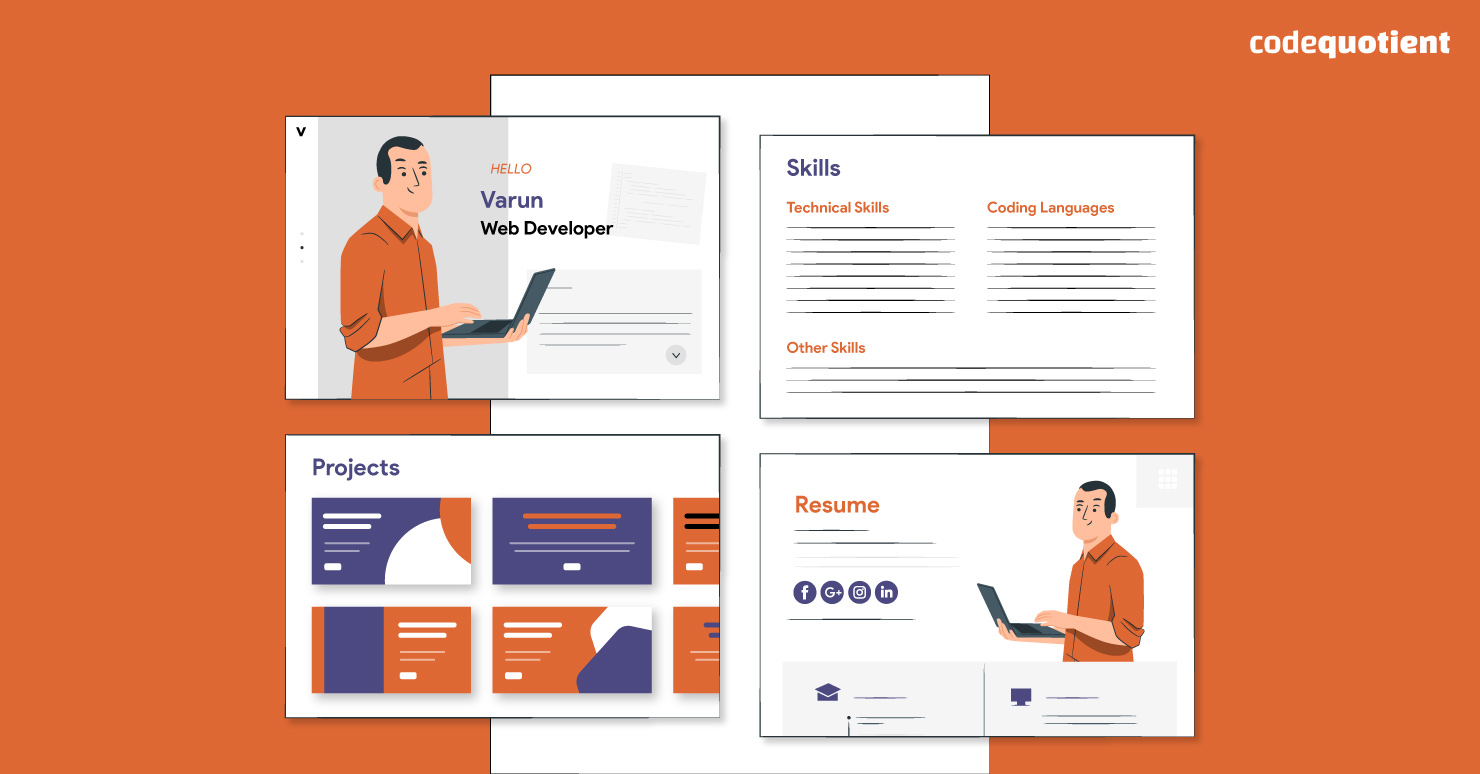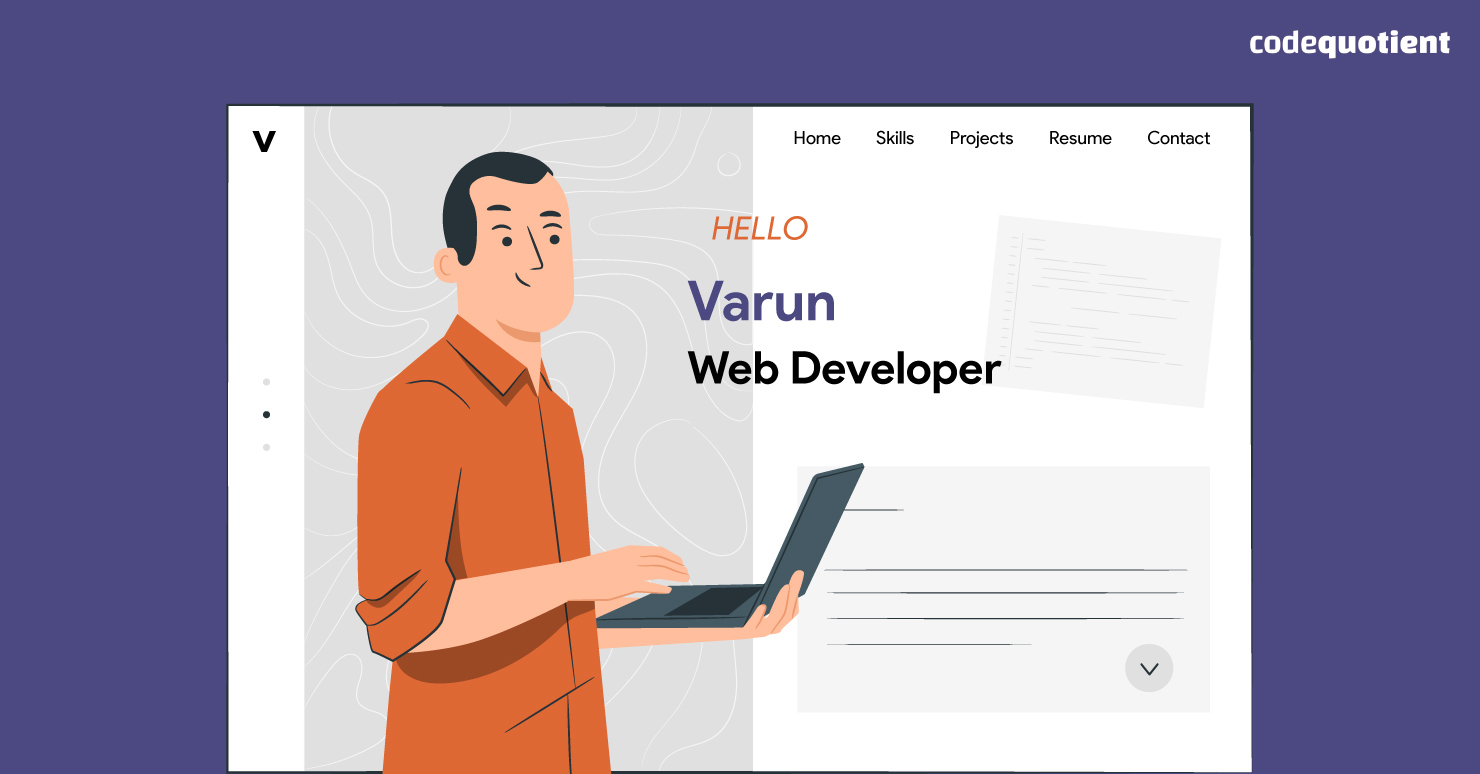A strong portfolio is essential for showcasing your web developer skills to potential employers or clients. Your portfolio represents your work and expertise, so ensuring it packs a punch is necessary.
In this article, we’ll explore the critical components of a web developer portfolio, provide tips for building one without experience, offer advice for those with previous work experience, and discuss where to host your portfolio.
What Constitutes a Portfolio for a Web Developer?
A web developer portfolio is a collection of your best work demonstrating your web developer skills and abilities. It showcases your web developer capabilities and should be designed to impress potential clients or employers. It’s also an opportunity to highlight your unique strengths and style.
Many excellent examples of portfolios showcase various web developer skills, creativity and styles. Some famous examples include the portfolios of Mandy Michael, Daniel Spatzek, and Melanie Daveid.
Essential Components of a Web Developer Portfolio

A web developer portfolio should have several key components. These include:
1. The Homepage
The homepage should be a brief introduction to who you are as a web developer. It should include your name, a professional photo, and a short bio highlighting your skills and experience.
2. A Skills Page
This page should provide an overview of your skills as a web developer. List your technical skills, coding languages, and any other relevant skills.
3. A Projects Page
This is where you’ll showcase your best work. Choose projects that highlight your strengths and showcase your unique style. Include details about the project, the tools you used, and any challenges you faced.
4. A Resume
It summarises your experience and education as a web developer. Keep it brief and relevant to the job you’re applying for.
How to Create a Web Developer Portfolio with No Prior Experience?
Building a portfolio may seem daunting if you’re just starting as a web developer. Here are some tips to get you started:
1. Establish a Personal Brand
Building a personal brand is essential for any web developer. Define your unique web developer skills and style and create a brand that reflects your personality and goals. This can include creating a logo, designing a website, and developing a social media presence.
2. Complete Online Courses
Online courses are an excellent way to learn new web developer skills and improve your knowledge. Many free and paid online courses are available that cover a wide range of topics, including web design, programming languages, and web development frameworks.
3. Search for New Web Development Projects
Participating in projects is a great way to gain experience and showcase your web developer skills. Look for opportunities to contribute to open-source projects, participate in coding challenges, and collaborate with other developers on personal projects.
4. Utilise WordPress to Create a Portfolio Website
WordPress is an excellent platform for creating a portfolio website. Choose a theme that showcases your work and use plugins to add functionality. Keep the user experience in mind and optimise your website for speed and performance.
5. Engage More on Social Media and Online Forums
Engaging with other developers on social media and online forums can help you build your network and learn new web developer skills. Join online communities, follow industry experts on social media, and participate in online discussions to stay up-to-date with the latest trends and best practices in web development.
6. Apply for an Internship
Internships are a great way to gain real-world experience and build your portfolio. Look for internships at local companies or apply for remote positions to gain experience in a specific area of web development.
How to Create a Web Developer Portfolio With Prior Work Experience?
Building a portfolio may seem more manageable if you have previous work experience as a web developer. Here are some tips to make the most of your experience:
1. Test the Functionality of Your Code
As a web developer with previous work experience, ensuring your code is functional and displays correctly is important. Test your code thoroughly to ensure it meets industry standards and showcases your coding expertise.
2. Highlight Your Top Projects
Choose the best projects from your previous work experience to showcase in your portfolio. Highlight each project’s strengths and details the techniques and tools you used to create them.
3. Highlight Your Inspiration
Share what inspired you to become a web developer and what drives you to excel in the field. This can help potential employers understand your passion for the industry and dedication to creating quality work.
4. Create Customised Pages
Customise your portfolio to make it stand out from the rest. Create custom pages showcasing your web developer skills and highlighting your strengths. This can include pages showcasing your design skills or highlighting your ability to code complex applications.
5. Prioritise User Experience
User experience is critical to web development. Ensure your portfolio is easy to navigate and provides a positive user experience. This can include using a clean design, optimising your website for mobile devices, and providing clear and concise information about your web developer skills and projects.
Where to Host a Web Development Portfolio
Many options for hosting your web development portfolio include GitHub Pages, WordPress, and Squarespace.
Consider the features and pricing of each platform before deciding the best one for your needs. It’s also important to ensure your hosting platform is reliable, secure, and easy to use.
Stand Out as a Web Developer: Build a Strong Portfolio and Gain In-Demand Skills with CodeQuotient’s Program
Building a portfolio is the perfect opportunity to demonstrate your creativity and expertise while standing out. So why not start building your portfolio today?
But wait, what if you’re just starting and have yet to gain much experience? That’s where CodeQuotient’s Software Engineering Program (CQ-SEP) comes in.
Not only can you gain a comprehensive understanding of web development concepts, but you can also earn. At the same time, you learn and obtain a UGC-recognised degree from a NAAC A+ accredited partner university.
You can also attain up to 2 years of relevant work experience and guaranteed placements in top tech companies.
Take advantage of this opportunity, and apply today!




